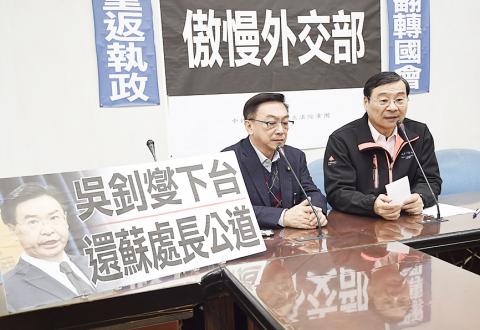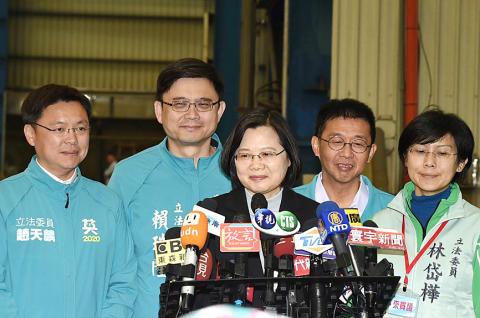Chinese Nationalist Party (KMT) lawmakers yesterday demanded that the Ministry of Foreign Affairs explain whether Representative to Japan Frank Hsieh (謝長廷) participated in an online posting that has been implicated in the suicide of a diplomat and was allegedly ordered by Yang Hui-ju (楊蕙如).
Led by KMT caucus whip William Tseng (曾銘宗), a group of KMT legislators and Taipei city councilors yesterday visited the ministry, demanding a meeting with Minister of Foreign Affairs Joseph Wu (吳釗燮).
The group was stopped by police stationed and a scuffle ensued. After trying in vain to enter the building for 90 minutes, the politicians left.

Photo: Chien Jung-fong, Taipei Times
The Taipei District Prosecutors’ Office on Monday charged Yang and a man surnamed Tsai (蔡) — who shares an IP address with Yang — with insulting public official Su Chii-cherng (蘇啟誠), then director-general of the Osaka branch of the Taipei Economic and Cultural Office, in a posting on the Professional Technology Temple bulletin board.
The fabricated report said that the Chinese embassy in Tokyo sent buses to evacuate Chinese from Kansai International Airport after Typhoon Jebi forced the airport to close on Sept. 4 last year, leading some Internet users to criticize the Taipei Economic and Cultural Office in Japan, headed by Hsieh, for not offering Taiwanese similar assistance.
On Sept. 6, Tsai allegedly defended Hsieh in an online post and blamed the Osaka branch, headed by Su. The post called the Osaka branch officials “the remaining evil elements of the party-state.”

Photo: Chang Chung-i, Taipei Times
Su committed suicide at his residence eight days later.
Media reports speculated that his death might have be linked to work pressure caused by the criticism.
Later yesterday, KMT legislators Lin Yi-hua (林奕華) and Chen Yu-chen (陳玉珍) said that their hands were injured during the fracas at the ministry, adding that they had to seek treatment at a hospital.
Meanwhile, Tseng criticized the ministry for its treatment of the lawmakers.
Ministry spokeswoman Joanne Ou (歐江安) said that the ministry deals with foreign affairs and it is not a place for “politicians to put on a show.”
She urged politicians to exercise self-restraint and not to take advantage of civil servants to reap electoral benefits.
President Tsai Ing-wen (蔡英文) said in response to media queries about Yang’s case that while the fabricated report about Kansai International Airport was soon debunked, the story had sparked conflicting views and opinions.
“In its immediate aftermath, members of the KMT legislative caucus, along with certain commentators in the media, were the ones launching attacks against our foreign affairs officials and Taiwan’s representative office in Japan,” she said. “The judiciary investigated and the media then clarified the matter, so people should not distort and magnify the incident to disparage all levels of the government.”
The finger-pointing going on is not fair to the nation’s diplomats, who are diligent and dedicated to their jobs, she said.
The president was asked about her relationship with Yang after she was shown a 2008 photograph in which she was talking to a group of people that included Yang.
“I do not know her well. There was no personal friendship,” Tsai Ing-wen said.
Additional reporting by Peng Wan-hsin

SECURITY: As China is ‘reshaping’ Hong Kong’s population, Taiwan must raise the eligibility threshold for applications from Hong Kongers, Chiu Chui-cheng said When Hong Kong and Macau citizens apply for residency in Taiwan, it would be under a new category that includes a “national security observation period,” Mainland Affairs Council (MAC) Minister Chiu Chui-cheng (邱垂正) said yesterday. President William Lai (賴清德) on March 13 announced 17 strategies to counter China’s aggression toward Taiwan, including incorporating national security considerations into the review process for residency applications from Hong Kong and Macau citizens. The situation in Hong Kong is constantly changing, Chiu said to media yesterday on the sidelines of the Taipei Technology Run hosted by the Taipei Neihu Technology Park Development Association. With

‘FORM OF PROTEST’: The German Institute Taipei said it was ‘shocked’ to see Nazi symbolism used in connection with political aims as it condemned the incident Sung Chien-liang (宋建樑), who led efforts to recall Democratic Progressive Party (DPP) Legislator Lee Kun-cheng (李坤城), was released on bail of NT$80,000 yesterday amid an outcry over a Nazi armband he wore to questioning the night before. Sung arrived at the New Taipei City District Prosecutors’ Office for questioning in a recall petition forgery case on Tuesday night wearing a red armband bearing a swastika, carrying a copy of Adolf Hitler’s Mein Kampf and giving a Nazi salute. Sung left the building at 1:15am without the armband and apparently covering the book with a coat. This is a serious international scandal and Chinese

A US Marine Corps regiment equipped with Naval Strike Missiles (NSM) is set to participate in the upcoming Balikatan 25 exercise in the Luzon Strait, marking the system’s first-ever deployment in the Philippines. US and Philippine officials have separately confirmed that the Navy Marine Expeditionary Ship Interdiction System (NMESIS) — the mobile launch platform for the Naval Strike Missile — would take part in the joint exercise. The missiles are being deployed to “a strategic first island chain chokepoint” in the waters between Taiwan proper and the Philippines, US-based Naval News reported. “The Luzon Strait and Bashi Channel represent a critical access

COUNTERINTELLIGENCE TRAINING: The ministry said 87.5 percent of the apprehended Chinese agents were reported by service members they tried to lure into becoming spies Taiwanese organized crime, illegal money lenders, temples and civic groups are complicit in Beijing’s infiltration of the armed forces, the Ministry of National Defense (MND) said in a report yesterday. Retired service members who had been turned to Beijing’s cause mainly relied on those channels to infiltrate the Taiwanese military, according to the report to be submitted to lawmakers ahead of tomorrow’s hearing on Chinese espionage in the military. Chinese intelligence typically used blackmail, Internet-based communications, bribery or debts to loan sharks to leverage active service personnel to do its bidding, it said. China’s main goals are to collect intelligence, and develop a